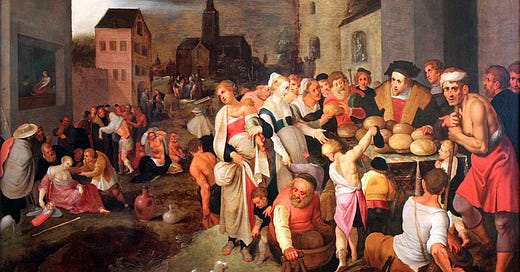Nothing Better to Do
How the corporal works of mercy give meaning to life and witness to the value of the human soul and body.
My husband has an uncle who spent the first many years of his retirement caring for his dying wife. Back when she had first been diagnosed with Alzheimer’s, she had expressed her fear of being put in a nursing home, and he had pledged to take care of her at home. That was a demanding load to place on himself, but by the grace of God he had the physical stamina to pull it off, and his own congenital stubbornness played a central role in grace building upon nature.
Not everyone can do that, nor should they. But he could.
An outsider, though, observed how he had given up all the freedom and comfort of the early retirement years, which for many people are those treasured few years of still having the health and stamina to pursue various personal interests, and now finally having the time to do so.
And that’s true. It was a great sacrifice he made, and he did not have to. It was a choice. But also, I observed: There is nothing better he could have been doing with his life.
The other observer thought about it and had to agree. We could think of a thousand more interesting, enjoyable, or easier ways to have spent those long, hard years, but there was nothing else he could have been doing, not a single other pursuit, that was more worthy.
Of everyone I’ve ever known, friends, family, in-laws, neighbors, colleagues . . . I will always look at my husband’s uncle and think: There goes a great man.
The corporal works of mercy — caring for the sick in this case — are pillars of our Catholic ministries. To a certain extent we do them just because we do. Feed the hungry, give drink to the thirsty, shelter the homeless, visit the prisoner, bury the dead, give alms to the poor . . . these are all obviously good things to do. You don’t need to be Christian to see that.
Christianity, though, takes it a step further: These are among the best things we can do.
To the extent that my life is full of things that are neither the worship of God nor the love of neighbor in the works of bodily or spiritual mercy, I’m either (rightly) supporting those works in some manner or (wrongly) squandering my life.
That’s not me encouraging scruples by any stretch. Leisure, education, attending to your physical and mental health, maintaining healthy relationships, involving yourself in community and public life . . . all of this, properly ordered, is either directly or indirectly at the service of souls.
We can be discerning about how we live our lives without thereby weighing ourselves down with artificial burdens.
I’ve written in the book about the concrete ways that typical service ministries fit into a framework of evangelization. I won’t repeat myself here.
What I want to say today is something that wasn’t so starkly in front of my face at the time I was writing the book. I’ve been on a sanctity of human life theme here recently, and that is in direct response to the growing explicit message in our wider society that human lives are only valuable some of the time.
That’s a lie.
If it’s worth investing our efforts in the bright young students preparing for great careers in public service (it is!), it is also worthwhile giving away our strength and time and money to care for those who will give “nothing” back in return.
==> I can’t bring myself to say “nothing” without the quotes, because I have never, in my sporadic and paltry resume of serving the least-of-these, experienced receiving nothing in return. Those times are my best memories. They are the times, of all I’ve ever done, that I received the most. But it was strictly a spiritual exchange, my effort given freely, expecting nothing, and grace flooding me anyhow.
But if the works of mercy have always been important, today they are urgent. They are our message to the world that the human soul is inherently priceless, and the human body — the expression of that soul — is a treasure to be cared for no matter how humble. No matter how unpromising.
This is not just a sign of heavenly things, it’s plain reality.
Artwork: The Seven Works of Mercy by Frans Franken the Younger, public domain.



